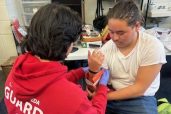During the panic of the spring sprint to opening weekend, we tend to forget to pay attention to the little details. We get preoccupied with making sure we have enough staff, which causes us to forget to make sure we have the best people for the job or that they’re trained to the fullest.
It is all too easy to only focus on whether a team member can pass the lifeguard skills when hiring and training rather than focus on their “softer” skills such as customer service; speaking; and the ability to explain policies, rules and directions to guests of all ages.
Last season I was reminded how important it is to make sure my entire team, including the lifeguards, is polished with the best customer service skills.
A couple of weeks into our summer operation, my team and I felt really good about the skill quality of our lifeguards. We started the season with a lot of first-year guards, which can be difficult, but our guards were off to a great season. Skills during in-service were textbook and guards were scanning machines while on stand. To top it all off, we had just passed a lifeguard audit with exceeding standards.
A few hours into a normal day of operation, there was a first aid call. The lead lifeguard responded and attended to a guest who had a bloody nose. As the lead lifeguard helped, the guest made a comment about the lifeguard at the bottom of the run-outs. The guest explained how their nose started bleeding at some point during their ride down the slide and when they got to the slide run-out, they saw the lifeguard posted there and asked for assistance. The guard at the run-outs blew a whistle for the lead lifeguard to come and told the guest, “It’s not my problem,” and proceeded to offer no additional assistance to the guest.
How did such a response to a guest “situation” come to pass? Every summer our operation gets into a great rhythm and runs like a well-oiled machine. During this time, it’s easy for staff and management to get complacent, especially on skills that are not safety related. Lifeguards frequently attend in-services that guarantee they are on top of their life-saving skills. However, we need to remember that, as an operation, it is just as important to make sure lifeguards know how to handle guest situations with great customer service and compassion.
Lifeguards interact with guests consistently throughout their shifts by explaining rules and policies, directing guests, dispatching slides, responding to first aid calls and more. We need to remember that just because a guard knows the first aid skills for a bloody nose, it does not mean they know the customer service skills for handling the situation.
The Lessons
1. Never assume that guards have great customer service skills. Take the time to train them on “softer skills” of customer service.
2. Make sure all guards know the emergency action plan, even for small incidents like a simple bloody nose or stubbed toe; how to handle it from their assigned location; and who to call for assistance.
3. Always have great documentation of first aid incidents and guest complaints. Include names of the guest, guard and dispatch; and signed statements and photos of location in the documentation.


